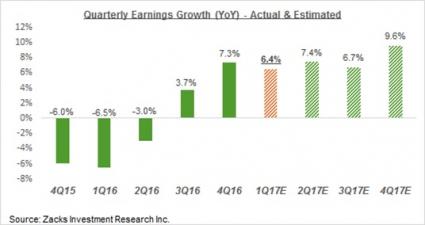From Election Day on November 8, 2016 through March 1 of this year, the S&P 500 charged higher. In what can only be described as a near straight-line ascent, the market gained over +12% in just under four months. For those keeping score out there, that’s quite a bit of gain in just a short amount of time.
Many media outlets and prognosticators rushed to label the upward move as the “Trump Rally,” suggesting that the market was eagerly pricing-in the likelihood of business-friendly policies like tax reform and deregulation. There could certainly be some truth to that – the market likes to anticipate changes to the earnings environment before the changes actually take hold.
But, then March happened. The S&P 500 corrected a bit and found itself in a sideways pattern that essentially produced no returns for the month. On Friday, March 24, there was a total withdrawal from the American Health Care Act, delivering a major blow to Republicans who had spent the better
part of seven years trying to repeal the Affordable Care Act. Many market participants took it as a potential sign that the high hopes they had built into tax and regulation reform were perhaps too high. It begged the overarching question: was confidence in the new Administration starting to fade? And by extension, did that mean the S&P 500 was set to give back some of these gains?
Part Trump Rally, Part Earnings Rally
The first key for investors: avoid looking at the market rally exclusively through the lens of a “Trump Rally.” It’s a fair point to say that the market posted some gains in anticipation of lower corporate taxes, looser regulations, and perhaps a sizable infrastructure bill. And all of those items could still happen – they are generally more suited to Republican policy-making than health care.
But, the danger of attributing market action so closely to what happens in the White House means grossly underestimating the impact of corporate earnings on stock prices. In other words, be careful in the current environment not to overweight the impact of politics on the equities markets. Corporate earnings matter just as much, if not more.
The earnings outlook remains solid, and has not changed in any meaningful way since the November election. Total Q1 earnings are expected to be up +6.4% from the same period last year on +6.4% higher revenues. This would follow +7.3% earnings growth in Q4 2016, on +4.7% revenue growth – the highest growth pace in all most two years. Not only did Q4 2016 growth reach the highest in two years, but total earnings for the quarter also reached a new quarterly record. Nobody talks about this point! But it’s very important to note.
Q4 marked only the second quarter in a row with positive earnings results, before which we’d endured a long earnings recession (mostly attributed to an Energy recession). We could be at the cusp of a long winning streak for earnings, and the stock market could respond favorably:

Bottom Line for Investors
Politics and policy do matter quite a bit, and we learned a lot from the health care struggle (as did the Trump Administration). Just as they did with the health care bill, the Freedom Caucus could be disruptors in getting tax cuts done if they are not convinced the cuts come in a revenue-neutral balance. The same could apply to the infrastructure bill, if it is seen as adding more to the deficit.
By and large, however, Republicans appear to be more united on cutting taxes and loosening regulations – so we would expect changes to come. The point is not to allow day-to-day politics from diverting your attention from the fundamental drivers of stock prices, the most important of which, in my view, is corporate earnings.
Disclosure
Zacks Investment Management, Inc. is a wholly-owned subsidiary of Zacks Investment Research. Zacks Investment Management is an independent Registered Investment Advisory firm and acts an investment manager for individuals and institutions. Zacks Investment Research is a provider of earnings data and other financial data to institutions and to individuals.
This material is being provided for informational purposes only and nothing herein constitutes investment, legal, accounting or tax advice, or a recommendation to buy, sell or hold a security. Do not act or rely upon the information and advice given in this publication without seeking the services of competent and professional legal, tax, or accounting counsel. The information contained herein has been obtained from sources believed to be reliable but we do not guarantee accuracy or completeness. Publication and distribution of this article is not intended to create, and the information contained herein does not constitute, an attorney-client relationship. No recommendation or advice is being given as to whether any investment or strategy is suitable for a particular investor. It should not be assumed that any investments in securities, companies, sectors or markets identified and described were or will be profitable. All information is current as of the date of herein and is subject to change without notice. Any views or opinions expressed may not reflect those of the firm as a whole.